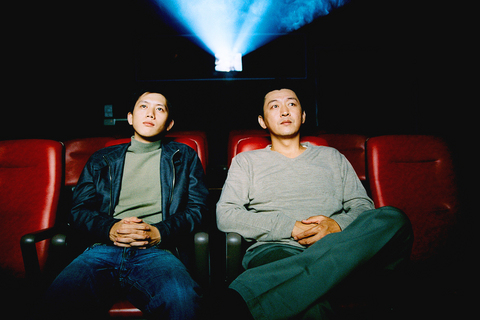A week before film director Cheng Yu-chieh (鄭有傑), 29, was due to premier his masterpiece Do Over (一年之初) at the Taipei Film Festival, he was still scrambling to coordinate subtitles with the movie’s frames at the Full Shine International Film Subtitling Company (福相國際電影字幕) in Ximengding (西門町).
“It’s better this way,” the young director said, referring to the looming deadline.
“Otherwise, I’d just keep making changes.”

PHOTO COURTESY OF ATOM CINEMA
Do Over, Cheng’s first 35mm feature film, is a NT$16-million budget production, and is the talk of the town. Cheng secured a generous government subsidy to cover half the production cost, and all that cash was apparently well spent: The film was selected to compete in both the local and inter-national categories of the festival, and will likely come away with top prizes.
But viewers beware: the plot requires your full attention. The movie weaves together five parallel stories that span 24 hours from the last day of an unspecified year to the first day of the next year. Although Cheng layers the narrative by depicting a film crew shooting a film (within the actual film) — a rather hackneyed theme in films shot by young directors who slip into self-indulgence in trying to make a movie about what they know best (ie. shooting films) — Do Over is nevertheless a sophisticated piece in terms of its visual style and storytelling.
Local media and critics have lavished Cheng with attention ever since his first film Baby Face (私顏) hit the screens and won an award at the TFF when Cheng was a junior at National Taiwan University (國立台灣大學). However, Cheng seems impervious to all the glam and glitter, and is more focused than ever on creating quality cinematic art.
The product of a loving and nurturing family, the young director embodied the ideal son and student. He also came into his own as a sensitive and perceptive artist at an early age. “When I was little, there was a movie theater under our home. I saw lots of movies,” Cheng told the Taipei Times, adding, “my after-school entertainment was to watch rentals at home.”
In college, Cheng began to approach filmmaking as a possible career. “When I first watched films by Jim Jarmush, Wim Wenders, and Krzysztof Kieslowski, I was like, ‘Wow, they are so cool.’” Cheng began experimenting with videorecording and wrote the script of Baby Face. He failed to secure government funds to shoot his script, but that didn’t deter him; he took matters into his own hands.
“I submitted an advertisement to the Taipei Film Archives (台北電影資料館) recruiting actors and a crew to shoot a short movie.” That was when veteran director and cinematographer Yeh Si-guang (葉斯光) came to Cheng’s aid. Aware that Cheng lacked the knowledge and experience to make the film successfully, Yeh volunteered to guide him through the production process from start to finish.
“That’s how things work in this business. When a person says that he or she has a new project to make, everybody will help the person and boost his or her confidence. The people who choose to stay in the industry are truly passionate about cinema, and we always try our best to help each other,” Cheng said.
After Baby Face, Cheng set out to make the 16mm, 30-minute film Summer Dream (石碇的夏天), which won the best short film award at the Golden Horse Festival and the best feature film award at the TFF. The film’s plot involves a college student who meets a Canadian girl during the summer at his grandmother’s grocery store. In
narrating the story, the film also addresses issues of cultural identity, particularly among youth that swing between eastern and western cultures, and between
modernity and tradition.
Identity seems to be a recurrent motif in Cheng’s works. In the most successfully
narrated segment of Do Over, an illegal immigrant named Ding An (定安) from Thailand works for Taiwanese gangsters for years in the hope that the big boss would help him to get an ID card. Willing to risk his life for a legal identity, Ding An
confronts the boss in the climax, shouting out the question that concerns all the people living on the island: who we are?
The anomic life of young urban
dwellers is brought out in another segment of the film that tells the tale of two Taipei youngsters who use drugs and embark on an inner journey.
Visually stylish and imaginative, the story does a fitting job and creates a contem-porary image of the younger generation.
But the director said that it was not his intention to highlight the life and spirit of youth in the film. “I guess being a guy like me living in a city like this naturally makes the film tinged with such aura,” Cheng said.
Musician Lim Giong (林強), veteran film editor Chen Po-wen (陳博文) and award-winning sound editing master Tu Duu-chih (杜篤之) helped Cheng bring his project to fruition.
The Leader Group (利達集團), Taiwan’s foremost digital media postproduction company that has participated in the making of US blockbusters such as The Matrix, invested in Do Over and the firm has sought opportunities to help the local movie industry with its state-of-the-art equipment and software.
Leader’s advanced technology opened up new horizons for Cheng. “Technological support made lots of things possible and suddenly we had so many options. When you face technical limitations, your creativity is put to a test. But when the possibilities open up, your creativity is also put on trial,” Cheng said.
Though the visual effects in the film aim to startle, character is the center of Cheng’s cinematic world. “Actually the film is tailor-made for Huang Jian-wei (黃健瑋) [who plays the role of Ding An]. I think actors are the most important part of a film.
“When I create a role and leave it to the actor, the characters are no longer mine and it is up to the actor to bring the role alive. In this sense, it is a collective work of performers and myself,” Cheng said.
Like Huang, most of the actors in the film are graduates of National Taiwan University of Arts (國立台灣藝術大學) theater department.
“I don’t work on schedule. I hold my ideas and thought and let them settle in while thinking of my actors. And when the time is right, the film will come naturally,” Cheng said.
Setting no plan for the future as he believes the future is unmanageable, Cheng takes a leisurely pace toward his filmmaking prospect as he feels the need to spend time examining his life and himself as well as the possibilities his actors can offer before moving on to the next project. “Hopefully, it [Do Over] won’t be my last film,” Cheng said.

Sept.16 to Sept. 22 The “anti-communist train” with then-president Chiang Kai-shek’s (蔣介石) face plastered on the engine puffed along the “sugar railway” (糖業鐵路) in May 1955, drawing enthusiastic crowds at 103 stops covering nearly 1,200km. An estimated 1.58 million spectators were treated to propaganda films, plays and received free sugar products. By this time, the state-run Taiwan Sugar Corporation (台糖, Taisugar) had managed to connect the previously separate east-west lines established by Japanese-era sugar factories, allowing the anti-communist train to travel easily from Taichung to Pingtung’s Donggang Township (東港). Last Sunday’s feature (Taiwan in Time: The sugar express) covered the inauguration of the

The corruption cases surrounding former Taipei Mayor and Taiwan People’s Party (TPP) head Ko Wen-je (柯文哲) are just one item in the endless cycle of noise and fuss obscuring Taiwan’s deep and urgent structural and social problems. Even the case itself, as James Baron observed in an excellent piece at the Diplomat last week, is only one manifestation of the greater problem of deep-rooted corruption in land development. Last week the government announced a program to permit 25,000 foreign university students, primarily from the Philippines, Indonesia and Malaysia, to work in Taiwan after graduation for 2-4 years. That number is a

This year’s Michelin Gourmand Bib sported 16 new entries in the 126-strong Taiwan directory. The fight for the best braised pork rice and the crispiest scallion pancake painstakingly continued, but what stood out in the lineup this year? Pang Taqueria (胖塔可利亞); Taiwan’s first Michelin-recommended Mexican restaurant. Chef Charles Chen (陳治宇) is a self-confessed Americophile, earning his chef whites at a fine-dining Latin-American fusion restaurant. But what makes this Xinyi (信義) spot stand head and shoulders above Taipei’s existing Mexican offerings? The authenticity. The produce. The care. AUTHENTIC EATS In my time on the island, I have caved too many times to

In a stark demonstration of how award-winning breakthroughs can come from the most unlikely directions, researchers have won an Ig Nobel prize for discovering that mammals can breathe through their anuses. After a series of tests on mice, rats and pigs, Japanese scientists found the animals absorb oxygen delivered through the rectum, work that underpins a clinical trial to see whether the procedure can treat respiratory failure. The team is among 10 recognized in this year’s Ig Nobel awards (see below for more), the irreverent accolades given for achievements that “first make people laugh, and then make them think.” They are not